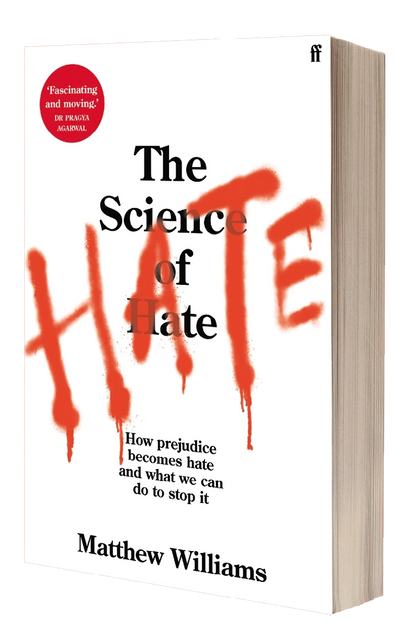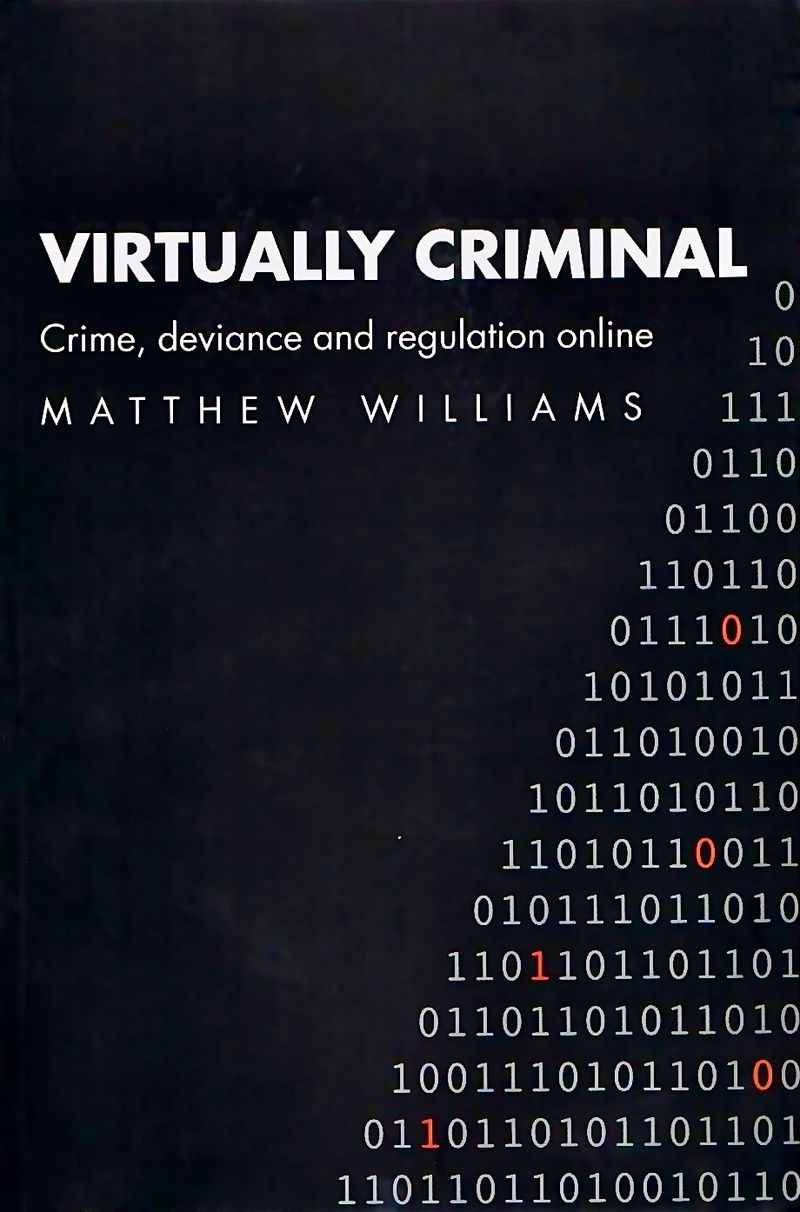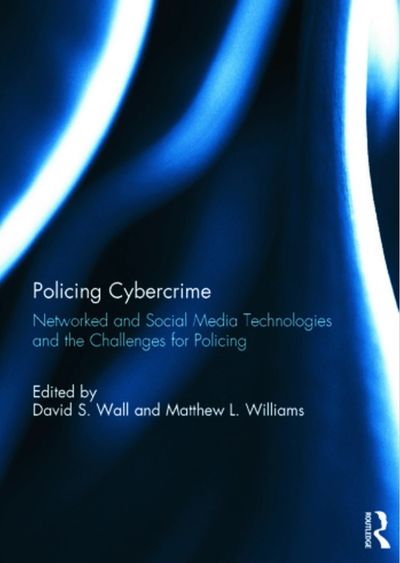New Book - The Science of Hate

For years, I have puzzled over the peculiar seductiveness of hatred and have wished there were a single, clear volume that helped me understand it better. Now there is.
— Joseph Margulies, Civil Rights Attorney, Professor at Cornell University and author of Guantanamo and the Abuse of Presidential Power
Important… an expert use of data with moving, personal storytelling. A key text for how we live now.
— David Baddiel
Utterly brilliant… powerful… From personal histories to broader social patterns, from individual criminal cases to the latest neuroscience and psychology, Matthew Williams’ forensic dissection of hate reveals its insidious power – but also its weaknesses. This book is not just about how and why hate happens – it’s about how to combat it.
— Alice Roberts, broadcaster and author of Ancestors and Buried
A truly insightful book that can help us all understand why hate can overpower us. It is wise, disarming, persuasive and compassionate.
— Robin Ince
Timely and superb.
— Dr. Rachel Clarke, bestselling author of Dear Life and Breathtaking
This is an incredibly powerful, important and valuable book on what causes hate and how we can help prevent and defeat it.
— Peter Tatchell
If we want to come together, we must take a cold hard look at what is keeping us apart. The Science of Hate does just that. It is a forensic exploration of the patterns of thinking that we inherit or absorb or cultivate, and how prejudice tips over into hate. Matthew Williams’s genuine curiosity and disarming writing style make for a truly engaging read. Bringing a scientific sensibility to such an emotive subject takes out the heat a little, and allows us to reflect on our conscious and unconscious biases in what feels like a safe space; after all, hate is an inside job.
— The Guardian (‘Books to Bring Us Together’)
Fascinating and beautifully written. I heartily recommend it.
— Hugo Rifkind ― The Times & Times Radio
An absolutely tremendous book…a harrowing but illuminating work, being released at a time when hate appears to be on the ascendency but far from trying to stop it, some of the world’s most powerful people seem to be using it to manipulate millions . . . At times it reads more like a thriller. Fascinating.
— David Marsland ― Evening Standard
Meet the man who won’t let the haters win…On the frontline of internet hate, observing shifts in behaviour and figuring out who is stirring the fury. An all-seeing eye for the racist, misogynistic, homophobic, transphobic venom that humans spit at one another from behind keyboards, Williams has [written]…a book that investigates the biological and sociological reasons why people commit hate crimes. The Science of Hate asks big, urgent questions: is everyone capable of hate? Is this the most hateful the world has ever been? And, perhaps most importantly, how can we combat it? He… want[s] to awaken us to the fact that “everyone” has prejudices… and, under the right mix of circumstances, has the potential to slide towards hateful behaviour. It’s a sobering thought in a woke era in which we’re loath to admit any prejudices. But it’s intended as a rallying cry. Being mindful of our own prejudices helps us keep them in check – and understanding how biases work better equips us to de-fang those who peddle hate, especially online.”
— Jamie Waters ― The Guardian
The Science of Hate is excellent. I can’t recommend it enough. It’s an indispensable guide to what’s gone wrong…throughout much of the Western world. If you want to know why the world is a bear pit read it.
— Neil Mackay ― The Herald
This sometimes harrowing but very necessary book couldn’t be more topical, but what gives it even greater impact is the fact that the author has himself been the victim of hate crime.
— Caroline Sanderson ― The Bookseller (Editor’s Choice)
An extraordinary book.
— Connie McLaughlin ― BBC Radio Scotland
An immensely readable journey through the history and science of what is unquestionably one of the most pertinent subjects of our time. This fascinating and ultimately hopeful book should be read by everyone. Illuminating and important, its pages explain the origins of the most destructive of human behaviours and contain a powerful call to action to challenge our own worldviews.
— Kerry Daynes, author of What Lies Buried and The Dark Side of the Mind
Amazing. Everything you could possibly want to know about hate. As someone who is not a criminologist, I can say it is completely gripping, readable, fascinating and very accessible. Full of insight and new information. Essential reading for anyone who’s interested in crime and its causes. I strongly recommend it.
–Sophie Hannah, bestselling crime novelist and author of the new Hercule Poirot mysteries
Perceptive, authoritative and above all a convincing analysis of the complex mechanics of hatred. Hatred is a frightening phenomenon, but understanding how it works, and why, must surely be the first step in understanding how to deal with it.
— Andrew Taylor, bestselling author of The Last Protector
Moving… fascinating… meticulously researched… written in a really accessible manner… expansive in approach and supplemented with so many real-world case studies. This is a really key contribution to our understanding of the divides in our society, and how these can perhaps be repaired.
— Pragya Agarwal, author of Sway: Unravelling Unconscious Bias
Williams is masterful at making this complex topic accessible, so we can all better understand hate and the dark side of human behaviour and finally, start to tackle it.
— Nova Reid, author of The Good Ally
Insightful. Accessible. Illuminating. Thought provoking. . . A forensic, unflinching and comprehensive enquiry into hate that also manages to be humane, generous and constructive. A great invitation for us to view ourselves ‘in the round’.
— Caryl Lewis ― author and lead writer on BBC/S4C’s HIDDEN
An accessible and beautifully researched book about the social, psychological and cultural conditions which drive people to hate, but also an invaluable toolkit that should be employed to eradicate hate from our communities.
— Professor David Wilson, author of A Plot to Kill and My Life with Murderers
Gripping from the first page. An in-depth and invaluable insight into the bigots and bullies of the world.
— Fox Fisher, LGBTQIA+ Rights Advocate and author of The Trans Teen Survival Guide
Such a clever insightful read. Written with a relatable, non preachy voice, methodically explaining rarely discussed mechanics within prejudice. The case studies were remarkable fascinating examples that stay with you. I wish this book had been written when I was a teenager. A very educational and important book of our time.
— Sunetra Sarker, Loose Women
This book is essential reading to understand the time we live in. Williams has the answers to questions we all have, and has articulated them with detailed research, knowledge and understanding. The real-life case studies of people and events are captivating and compelling, and are written with empathy and intelligence. A fascinating and eye-opening book.
— Shazia Mirza, comedian and broadcaster
Professor Williams’ expert analysis has been fundamental to several high-profile prime time TV documentaries on the rise of hate crime and speech. He has the unique ability to translate highly complex science into meaningful, accessible and impactful journalism that a mass audience can easily comprehend.
— Mark Alden, producer and director of Hate on the Streets (BBC Panorama) and Brexit Online Uncovered (ITV Exposure)
Professor Matthew Williams is one of the most noted scholars of cyber-hate in the world and has a particular gift for rendering complex analysis comprehensible. His interest in hate crime is long standing and it has been his passion to communicate his own deep understanding of the subject to a general audience.
— Professor Mike Levi, Cardiff University, Senior Research Fellow at RAND Europe and Senior Associate Fellow at the Royal United Services Institute
Virtually Criminal

Virtually Criminal provides an empirically grounded criminological analysis of crime, deviance and regulation online. It presents one of the first ethnographic studies of online forms of violence within an online community, including harassment, hate speech and vandalism. Pioneering and innovative, this fascinating book will be of interest to students and researchers across the disciplines of sociology, criminology and criminal justice, law, linguistics, and communication studies.
Shortlisted for the Philip Abrams Memorial Prize.
‘A fascinating account of the nature of crime committed in the context of an online virtual community … a rich ethnographic account’.
‘The extent of the qualitative work undertaken is fascinating and genuinely impressive.’
‘Scholarship moving beyond criminological theory into discussions of the information society, technology and virtual communities.’
‘…moves clearly from a discussion of different theoretical approaches to on and offline communities, the nature of “crime” and deviance, its analysis and regulation.’
‘Written in a good and clear writing style with complex issues well explained and with a good clear argument constructed.’
Policing Cybercrime

Cybercrime has recently experienced an ascending position in national security agendas world-wide. It has become part of the National Security Strategies of a growing number of countries, becoming a Tier One threat, above organised crime and fraud generally. Furthermore, new techno-social developments in social network media suggest that cyber-threats will continue to increase.
This book addresses the recent ‘inertia’ in both critical thinking and the empirical study of cybercrime and policing by adding to the literature seven interdisciplinary and critical chapters on various issues relating to the new generation of cybercrimes currently being experienced.
The chapters illustrate that cybercrimes are changing in two significant ways that are asymmetrical. On the one hand cybercrime is becoming increasingly professionalised, resulting in ’specialists’ that perform complex and sophisticated attacks on computer systems and human users. On the other, the ‘hyper-connectivity’ brought about by the exponential growth in social media users has opened up opportunities to ‘non-specialist’ citizens to organise and communicate in ways that facilitate crimes on and offline. While largely distinct, these developments pose equally contrasting challenges for policing which this book addresses.
